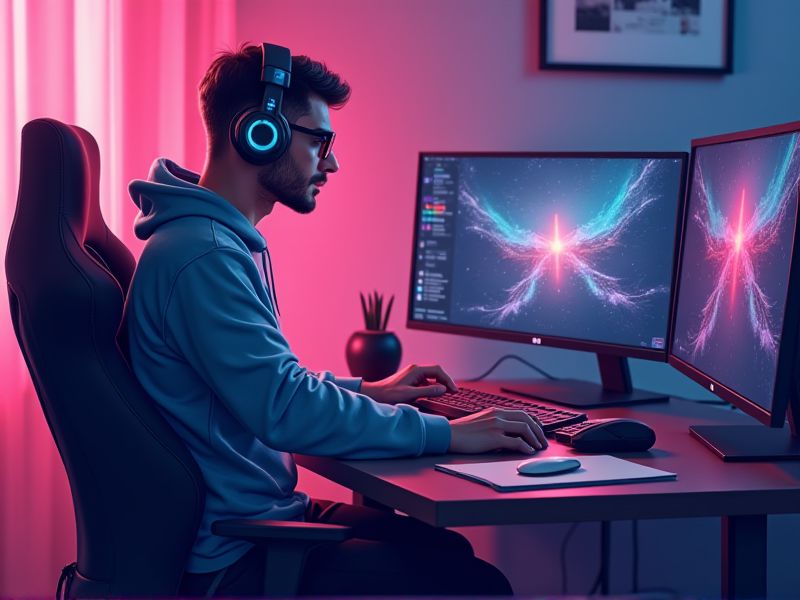
Dr. Harold Winston's quote, "Never accept the world as it appears to be. Dare to see it for what it could be," can inspire players to improve in Overwatch 2 by challenging their perspectives on gameplay. By adopting this mindset, players can innovate their strategies, such as experimenting with different heroes and playstyles to counter opponents effectively. This approach also encourages players to stay adaptable and responsive to changing team compositions and enemy strategies. By continuously seeking new ways to improve, players can elevate their performance and contribute more effectively to their team's success.
How to Be Better at OW2
Communication
Clear, concise callouts of enemy positions and ultimate statuses ensure that your team is always aware of evolving threats and opportunities. Using voice chat for rapid exchanges facilitates real-time strategy adjustments, reducing the lag between events and responses. Regularly coordinating strategies and sharing critical in-game updates builds trust and improves overall team performance, which has been shown to increase win rates. Prioritizing active listening alongside your own communication efforts creates a feedback loop that transforms scattered information into decisive, collective action.
Map awareness
Analyzing the map layout during each match increases spatial awareness, which naturally strengthens your ability to predict enemy movements. Focusing on high-activity zones and common flare points causes a direct improvement in your positioning and rotation. Sharing precise callouts based on observed enemy behaviors results in enhanced team coordination and reduced ambush vulnerabilities. Reviewing professional matches yields actionable insights into map control strategies that systematically refine your map awareness skills.
Positioning
Study each map to pinpoint high-ground positions and key chokepoints that enhance your field vision and control. Focus on maintaining flexible positions, so you can quickly transition between defensive and offensive stances while minimizing exposure. Coordinate with your team to establish crossfire zones that cover critical areas and prevent enemy flanks. Analyze enemy movement and adjust your positioning dynamically to keep the advantage and disrupt their strategies.
Ultimate management
Mastering ultimate management in Overwatch 2 begins with understanding your hero's ultimate potential within the context of your team's composition and enemy strategies. Timing is crucial, so communicate actively with your team to synchronize ultimate use and exploit moments when enemy defenses are down. Analyze game data to see patterns in opponents' cooldowns and positioning, enabling you to anticipate and counter their moves effectively. Consistent practice and reviewing gameplay metrics enhance decision-making, ensuring every ultimate is used to its maximum impact.
Hero versatility
Studying and mastering multiple heroes develops adaptive gameplay that counters opponents' strategies effectively. Embracing hero versatility produces a cause-and-effect relationship where understanding each hero's unique abilities improves situational responses in matches. Regular practice across various roles, supported by reviewing performance analytics and meta-trends, significantly boosts your impact in competitive play. Expanding your hero pool cultivates flexibility that, when combined with strategic loadout adjustments, creates an environment for improved team synergy and overall success.
Team coordination
Team coordination in Overwatch 2 is optimized by setting clear roles where each member knows their specific responsibilities, leading to a synchronized attack or defense. Effective communication, whether via voice chat or in-game pings, reduces confusion and enhances real-time decision-making. Using data-driven feedback such as post-match analysis helps in identifying gaps in coordination and adjusting strategies for better team synergy. Practicing coordinated movements in custom games and scrimmages directly translates into more efficient responses during critical match moments.
Mechanical skill improvement
Focusing on daily aim training drills builds muscle memory and significantly improves tracking precision. Fine-tuning sensitivity settings in aim trainers establishes a direct connection between hand movements and in-game responsiveness. Analyzing gameplay data exposes areas of weakness and directs subsequent training to fix mechanical errors. Consistent, segmented practice sessions reinforce habits, resulting in faster reaction times and more reliable performance under pressure.
Strategic rotations
Strategic rotations in OW2 are enhanced by mastering map layouts and identifying high-impact positions that force enemy repositioning. Consistent communication with your team and real-time data analysis--in terms of enemy movements and ultimate capacities--allows you to execute rotations with precision. Evaluating engagement outcomes and adapting your rotation tactics based on successful patterns leads to more efficient target prioritization. Incorporating this approach raises your overall game control while influencing the enemy's decision-making process.
Game sense development
Develop an advanced game sense by studying map layouts and understanding common enemy strategies, which will give you practical insights to anticipate movements and plan counter-actions. Reviewing gameplay footage--whether your own or professional streamers'--helps you identify key decisions and mistakes, then apply those observations to improve your real-time decision-making. Incorporating consistent communication with your team to relay enemy positions and potential threats sharpens your overall situational awareness and strategic coordination. Combining focused practice sessions with continual review ensures that small improvements accumulate, gradually refining your instincts to make smarter in-game choices.
Consistent practice
Consistent practice in Overwatch 2 translates directly into refined mechanics and enhanced reaction times, as frequent repetition strengthens motor skills. Regular training schedules enable players to internalize map layouts, hero abilities, and strategic nuances more effectively. Focused practice sessions create a feedback loop where recognizing mistakes leads to targeted improvements, thereby accelerating progression. This iterative process of play, reflection, and adjustment causes an overall enhancement in competitive performance.
Summary
Clear communication synchronizes strategies and empowers teammates to execute coordinated plays based on real-time data. Enhanced map awareness sharpens situational understanding, enabling players to predict enemy movements and seize tactical opportunities. Smart positioning leverages environmental advantages, ensuring optimal angles for both offense and defense while minimizing vulnerabilities. Integrating these elements transforms individual efforts into team-driven success, directly influencing match outcomes.
